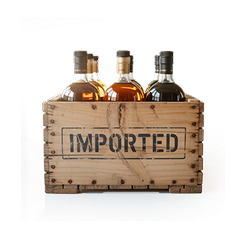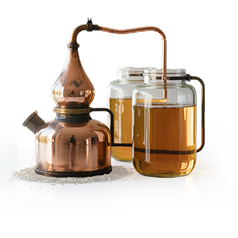WHAT EVERY CONSUMER SHOULD KNOW




South Africa’s Illicit Alcohol Trade
Illicit alcohol.
Some margins come at a cost.
Know better. Buy better.
.webp)
Illicit alcohol has become part of South Africa’s everyday reality.
It’s inexpensive, easy to find, and often resembles the real thing. But behind the familiar labels and low prices are risks that go far beyond what’s in the bottle. People have lost their health, their lives, and their businesses because of this growing trade. It’s time to understand what’s really at stake and uncover the hidden cost.
What is Illicit Alcohol?
Illicit alcohol refers to any alcohol that is produced, distributed, or sold illegally.
It avoids safety standards, taxes, and regulations. This includes:
It avoids safety standards, taxes, and regulations. This includes:

Counterfeit alcohol
Fake products that imitate trusted brands.

Smuggled or untaxed stock
Often sold without the proper taxes or duties being paid, either because it was smuggled across borders or misdeclared.

Counterfeit alcohol
Traditional fermented or distilled alcoholic drinks that become illegal once sold, as they do not comply with national alcohol regulations and standards.
Why it Matters.
Illicit alcohol accounts for 18% of all alcohol consumed in South Africa, seeing a 55% growth in 7 years. Nearly 1 in 5 alcoholic purchases in South Africa is illicit. This costs the economy over R16.5 billion a year in lost taxes. It also fuels organised crime, harms legitimate businesses, and can be deadly for consumers.
Health Risks.
Counterfeit alcohol is dangerous. It can contain chemicals like methanol that put your health at serious risk, including blindness and organ failure.
.webp)
Why It Matters For Businesses.
Selling illicit alcohol is illegal and comes with severe consequences. It doesn’t just put your customers in danger. It puts your reputation and your livelihood at risk. Illicit alcohol can end your business.
.webp)
Penalties.
If you’re caught trading illicit alcohol, you can face:
- Fines up to R1 million.
- Imprisonment of up to 5 years.
- Seizure and destruction of all stock.
- Loss of your liquor licence.
How to Protect Your Business
Know your suppliers, check your stock:
- Always ask for valid invoices and proof of origin.
- “Export Only” marks indicate that some products are not for local sale.
- “Export Only” marks indicate thatsome products are not for local sale
- Verify bottle sizes-700ml bottles are illegal.
.webp)
The Bottom Line
Illicit alcohol harms more than just those who drink it — it impacts businesses, communities, and the economy. By staying informed and making responsible choices, you can help uncover the hidden cost and protect what matters most.

